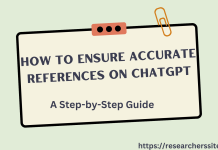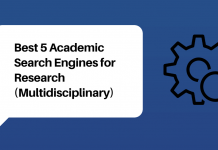In this post, I am going to share with you the best 10 chrome extensions for academic research. In my earlier blog, we discussed various research tools for academic researchers.
Be sure to also check out part 3 on 7 must-have Chrome extensions for academic research and part 2 on must-have browser extensions for academic research of the series if you want to utilize more Google Chrome extensions!
This is part 1 of the 5-part blog post series on chrome extensions for academic research.
In this blog post, I would like to acquaint you with the best 10 web browser extensions for academic research (in no particular order).
List of Best 10 Chrome Extensions for Academic Research
Here, I will share the 10 best Google Chrome extensions for academic research that you should not miss.
There are thousands of Chrome extensions in the chrome web store, but to save your time and hard work, I have shortlisted ten amazing chrome extensions for your research here.
But, before that, let’s take a look at the definition of extension!
A web browser extension is nothing but a tiny software application that integrates functionality to a web browser.
Let’s get right to it!
#1. Unpaywall
Unpaywall caters to author-hosted articles, legal manuscripts that are hosted in the academic servers. It indexes of approx 27 million free, legal full-text PDF files.
Unpaywall integrates a button in the right upper corner to access the articles. In our article, we discussed and demonstrated how to find free open access full-text journal articles using the Unpaywall.
#2. EndNote Click ( Formerly Kopernnio) – Powered by Web of Science
You can access millions of research paper PDFs in one click on Web of Science, Meta, PubMed, arXiv, Scopus, and thousands of more academic websites.
It assists you to obtain your full-text PDFs faster by securely connecting you to your library’s journal subscriptions and open access content.
#3. Scholarcy
Scholarcy is an artificial intelligence-based manuscripts summarization extension. It collects text from journal articles, conference papers and book chapters, research manuscripts, and caters an auto-summary of the text.
In addition to that, it also extracts figures, tables, and bibliographies data, open-access PDFs for each reference from Google Scholar, arXiv, etc. We wrote a post on how to summarize a research article (Academic) using Scholarcy
#4. Google Scholar Button
Google Scholar Button lets you access the full-text article on the web.
In addition, you can also access the subscribed e-journal, e-resources from your esteemed library. You have to set up for accessing the e-resources off-campus through this Link.
#5. Zotero Connector
Zotero is a free open-source easy to handle reference management tool. It lets you manage the bibliographic data and other research e-resources. It is also called your personal research assistant. After installation of Zotero, you can use the Zotero connector extension to detect the content as you browse the internet and permit you to save materials to Zotero. In my blog post, we demonstrated how to insert citations in word documents using Zotero.
You can download Zotero using this link. Click Here
#6. Paperpile
Paperpile permits you to collect, organize, annotate and cite research papers in Chrome.
Besides, this extension works with Paperpil sites, an easy-to-use reference, and a citation manager. You can sign up through this link. Click Here
#7. Scopus Document Download Manager
Scopus Document Download Manager is free and easy to use which enables download functionality in Scopus. This tool saves you the hassle of accessing individual publisher websites to download documents one by one.
#8. Cite This For Me: Web Citer
At present automatically website citation is a difficult task. During the citation of the website, we have to face challenges. To alleviate this issue web citer plays a pivotal role. Cite This For Me extension lets you construct website citations automatically in the APA, MLA, Chicago, or Harvard referencing styles.
#9. Mendeley Web Importer
Mendeley Web Importer detects research paper and manuscript identifiers on the page you are visiting and automatically fetches metadata as well as PDF full texts (where available) for you to add to your library.
You have to have a Mendeley account for saving and citing the manuscripts you import. After signing up using the following website you will get 2GB free storage space https://www.mendeley.com
#10. Mercury Reader
The Mercury Reader removes ads and distractions, leaving only text and images for a clean and consistent reading view on every site.
You can download the above chrome extensions for academic research from here.
Looking for the Google Chrome extensions to take your academic research to the next level?
If you’re a Google Chrome user, you can use chrome extensions to make your research more productive.
I hope you liked this post on Best 10 Chrome Extensions for Academic Research.
Let me know in the comment box if you have any feedback.












